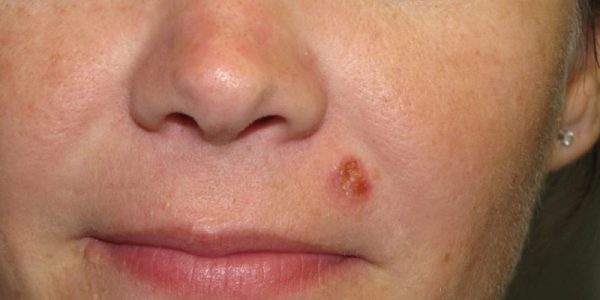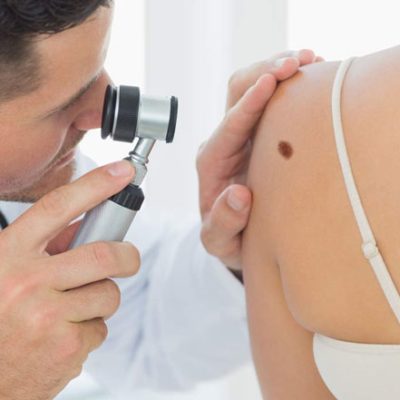Basal Cell Cancer

Basal Cell Cancer (BCC) is the most common skin cancer
- BCC is the most common skin cancer, commonly developing over sun-exposed areas of the body.
- Most BCCs are slow-growing and almost never spread to other parts of the body
- Most BCCs are easily treatable with complete cure achieved from Mohs Surgery or surgical excision
Basal Cell Cancer (BCC)
Basal cell carcinoma, or BCC, is a cancer of the basal cells at the bottom of the epidermis. It is sometimes called a rodent ulcer as it slowly grows into the skin causing bleeding and ulceration.
BCC is the most common type of skin cancer and mostly develop in areas of skin exposed to the sun such as the head, face, ears and neck.
Most BCCs are slow-growing and almost never spread to other parts of the body.
Nearly everyone with a BCC who has treatment is completely cured, but some BCCs are aggressive, and, if left to grow, may spread into the deeper layers of the skin and sometimes to the bones.
A small number of BCCs may also recur in the same area of skin after treatment (local recurrence).
What causes Basal Cell Cancer?
As with all skin cancers, exposure to ultraviolet (UV) radiation in the forms of sunlight or artificial tanning is the major cause of most BCCs.
Those more at risk of developing BCC include fair skin individuals who are more likely to burn in the sun, people who have spent prolonged periods exposed to sunlight (certain professions or hobbies) and those with frequent use of tanning beds.
How do I tell if I have Basal Cell Cancer?
BCC can appear anywhere on the body, but most commonly found on areas of the body which are more frequently exposed to sunlight, including the face, head, neck and ears.
There are several types of BCC-
- Superficial BCC occurs only on the skin surface, and may resemble a patch of eczema which does not respond to treatment
- Nodular BCC is the most common type, it starts as a lump which may slowly get bigger, bleed and develop into an ulcer
- Infiltrative BCC is less common and may not show any obvious lump on the surface, although the cancer cells have invaded deep into the skin
It is important to seek treatment for any suspicious skin growth. Our dermatologist can examine the skin growth in detail and perform a skin biopsy to confirm the diagnosis.
How can I prevent Basal Cell Cancer?
When out in the sun, it is important to protect the skin from sunburn by using a high
factor sunscreen, avoiding the sun during the hottest part of the day and covering the
skin when exposed to sunlight.
Minimise chronic sun exposure can prevent sun damage of the skin, reducing the risk of developing BCC.
How is Basal Cell Cancer treated?
The most common and best treatment for BCC is surgical excision. Cancer cure is achieved by removing the skin lesion entirely by Mohs Surgery or wide excision, to ensure that no cancer cells are left behind. Mohs Surgery is still the best treatment to ensure the best cure rate and minimise surgical wound.
Depending on the type, location and severity of BCC, our dermatologist will discuss treatment options. There are other treatment such as cryosurgery using liquid nitrogen freezing spray, topical creams, photodynamic therapy, curettage with electrosurgery, and radiotherapy.
Read The Straits Times article on skin cancer and Mohs Surgery by Dr Tay Liang Kiat

DISCLAIMER:
The information written and published on this website is not intended to substitute the recommendations of a trained professional and does not replace a professional consultation.
It is advisable to undergo a formal consultation to help establish a relationship between the doctor and yourself, accurately determine your concerns/problems, and get the appropriate treatments for them.
It is also imperative to note that the contents of the website with respect to treatments, results and pricing can vary from individual to individual, and can only be accurately determined by the doctor upon diagnosis.
Do note that all medical treatments will only be administered upon proper consultation, with the requirement that patients be above 21 years of age to provide legal consent.
Skin Cancer
Meet your Dermatologist

Dr Tay Liang Kiat
Dermatologist
Dr Tay Liang Kiat is a fully accredited Dermatologist who specialises in skin cancers, Mohs micrographic surgery, dermatologic and nail surgery, aesthetic dermatology and laser procedures. With more than 20 years of clinical experience, he also manages other aspects of general ambulatory and inpatient dermatology, including eczema, psoriasis, acne, urticaria, hair loss, children skin issues and other complex medical dermatology. In addition, he has expertise in the use of the latest immunotherapy (biologics) treatment for severe eczema, psoriasis and urticaria.






